
It's often said that Patti LuPone and Betty Buckley "invented" the kind of high belting common in musicals today. That is certainly true, considering the altitude of notes they sang full voice in shows like 1776, The Baker's Wife, Evita and Cats. Of course, this kind of late 20th-century pop approach to theatre songs must also trace its roots a few years farther back to Barbra Streisand. But in terms of the type of rock 'n roll wailing emulated in shows like Rent and Wicked, I think the earliest common vocal ancestor is the late, great Laurie Beechman.
Beechman didn't exactly sing in an unadorned, natural voice. While no one could deny Beechman's God-given talent, she had some mannerisms and a nasal placement to accommodate a sort of pop quality. This afforded her the ability to belt out a wide range of notes with a great deal of passion and intensity. I think this is part of what Andrew Lloyd Webber was referring to in her first solo album's liner notes, when he praised her "sheer guts." Whatever Beechman sang, she sang with abandon, and this was thrillingly channeled into expressions of both pain and joy. Beechman's untimely death, due to ovarian cancer at age 44, surely robbed the world of decades of great work, but she nonetheless leaves behind a legacy of recordings worthy of celebration.
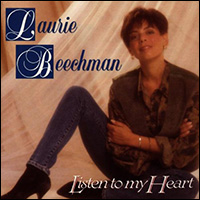 |
||
| Cover art |
 |
||
| Cover art |
Laurie Beechman's final solo album is a less consistent affair than her debut, mostly due to some cheesy synth-heavy orchestrations that were very 1990s. There are still some knockout performances, though — even on the more easy listening-style tracks, nothing can get in the way of Beechman's immense artistry. After a whimsical and peppy, bright-eyed and bushy-tailed opening with "These Are The Good Times" (from Alan Menken and Tom Eyen's unproduced Kicks: The Showgirl Musical), Beechman scores on a series of "Songs Of Hope And Inspiration From Broadway" (as the album is subtitled), including "Someday," "Climb Every Mountain," "I Am Changing" and "On A Clear Day (You Can See Forever)." My go-tos are an impassioned duet with her sister on Jacques Brel's "If We Only Have Love" and an absolutely electrifying duet with Sam Harris on a Leonard Bernstein medley (“Make Our Garden Grow" and "One Hand, One Heart") where it's hard to keep track of which magnificent voice is trilling which ridiculous note as the arrangement builds to its mind-blowing conclusion.
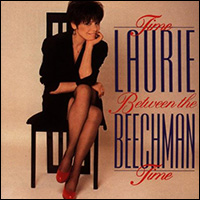 |
||
| Cover art |
Laurie Beechman's second solo album is her classiest, most restrained effort, although even in this cooler, jazzy cabaret mode, the Beechman fire still burns bright. A selection of standards and showtunes finds her in a mellow, contemplative, often melancholy mood, singing with great sensitivity. She manages to make even the most played out of pop ballads compelling, such as "It Might Be You" and "The Shadow Of Your Smile," and the inherent beauty of her voice is remarkable in this relaxed vibe. That's not to say she doesn't give the big barnstormers their due — Bacharach's "A House Is Not A Home" and "Home" (from The Wiz) are both as huge and goosebump-inducing as you'd hope the Laurie Beechman versions would be. Still, it's the surprise plums like "A Very Precious Love" that make "Time Between the Time" the standout it is.
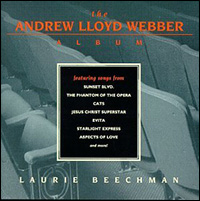 |
||
| Cover art |
An album of all Laurie Beechman singing all Andrew Lloyd Webber may be too much of a good thing. As evidenced by her earlier recordings of "Memory" and "Unexpected Song" (and by her Tony-nominated turn as the Narrator in the original Broadway production of Joseph And The Amazing Technicolor Dreamcoat and replacement run as Grizabella in Cats), Beechman had the perfect pipes for Lloyd Webber's syrupy showstoppers. The hitch with "The Andrew Lloyd Webber Album" is that these arrangements go too far. For example, at the end of "As If We Never Said Goodbye," after she sings "We'll have early morning madness, we'll have magic in the making," she adds the additional words, "We'll have fairy tale adventures in this ever-spinning playground." The song was schmaltzy enough to begin with. This approach is rampant on the album, so, not surprisingly, the best tracks are the more restrained productions where Beechman is able to give a lighter touch, especially a warm, ardent "I Don't Know How To Love Him" and a rapturous "Love Changes Everything," both of which bear the unique honor of being the only recordings of the song to rival the original. That said, my guilty pleasure is Beechman's take on "Starlight Express," which builds and builds through keychange after keychange, offering unrelenting fabulousness.
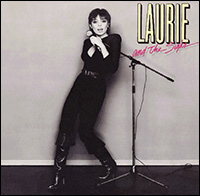 |
||
| Cover art |
Something of an anomaly in the Laurie Beechman discography is this recently re-released album by her New Wave band, Laurie and the Sighs. Considering the power of Beechman's voice, it's no wonder that rock musicians and no less than Atlantic Records would want to work with her. This appealing disc is a fun foray for fans who also appreciate Pat Benatar, Blondie and even The Go-Gos and Siouxie and the Banshees. Beechman's youthful voice belting up a storm on track after track is an embarrassment of riches.
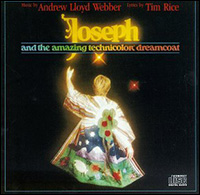 |
||
| Cover art |
Thanks to the global success of Steven Pimlott's massive 1991 West End revival, Joseph and The Amazing Technicolor Dreamcoat has become in most people's minds a juggernaut of an extravaganza built around a heartthrob in a loincloth and replete with a populous children's chorus, nearly life-size replicas of the Wonders of the World and a lengthy "mega-mix" rehashing the show's hits before you can leave the theatre. There isn't much room for an individual to make a human connection amidst all that ruckus, and it's a far cry from the show's humble origins as a church cantata in 1968. By the show's 1982 Broadway premiere, it was already well on the way to the campy pageant it would become in its 90s revival, so perhaps only Laurie Beechman could shine through the spectacle. And shine she did. Beechman must have had gargantuan lungs to fill out Lloyd Webber's lengthy lines with nary a breath and still infuse Tim Rice's lyrics with so much personality and heart. Just try not to be charmed by her perfect embodiment of this quirky telling of the biblical tale. Only Beechman could go from self-consciously anachronistic punchlines to gospel caterwauling and back again without even seeming to blink. It doesn't matter how many calypsos or Elvis impersonators are bouncing around, when Beechman belts out the climactic, "Strange as it seems, there's been a run of crazy dreams. And a man who can interpret could go far, could become a star," there's no question who the real star is.
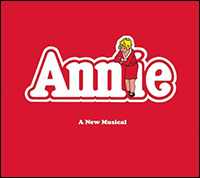 |
||
| Cover art |
If "there are no small parts, only small actors," perhaps there are no big voices, only Laurie Beechman. Certainly, Charles Strouse and Martin Charnin thought so when they added an entire verse to "N.Y.C." (the Act One closer in Annie) to showcase Beechman's monumental gift. It's just a verse and represents nearly her entire solo contribution to the cast album, but it makes a lasting impression. Seth Rudetsky offers the best description.
(Ben Rimalower is the author and original star of the critically acclaimed Patti Issues. Read Playbill.com's coverage of the solo show here. Visit him at benrimalower.com and follow @benrimalower on Twitter.)






-Matthew-Murphy.jpg)



